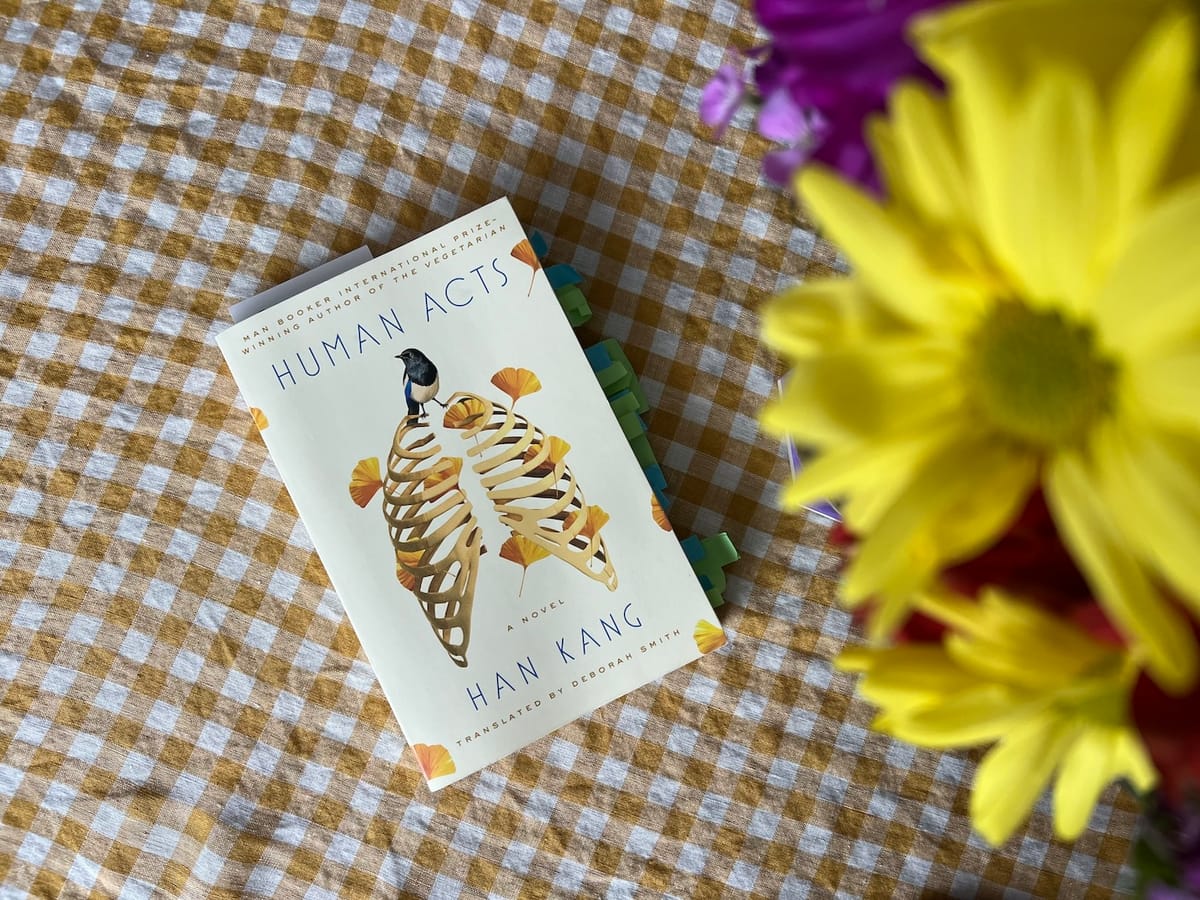Human Acts by Han Kang

"It seems like we might have to move to the United States. President Yoon declared 계엄령 (Gye-eom-ryeong) in Korea."
It was on the morning of December 3rd, 2024, my mom's last full day of her month-long journey in San Francisco. I was half asleep lying next to her when she said this. I knew what the word "계엄령" meant, it means "martial law," but I thought maybe I had mistaken that word for something else. How could martial law be imposed in today's Korea?
Upon unlocking my phone, I saw 70 unread KakaoTalk messages.
President Yoon did, in fact, declare martial law using North Korea infiltration in the government as a reason, and ordinary Korean citizens took to the streets to fight against it.
"I hope they don't attack the citizens like they did during the Gwangju Uprising in 1980. My university was closed for awhile." My mom said.
The last time I reflected on the Gwangju Uprising was exactly a year ago in December 2023, after watching the Korean movie 12.12: The Day. The movie is based on the December 23th Coup d'état led by Chun Doo-hwan, a major general during the period following the assassination of Park Chung-hee, South Korea's notorious authoritarian leader who was in power for 18 years. The movie portrays Chun (the antagonist) seizing the power by persuading key military figures to support him during a fragile moment in Korean history.
Although the movie doesn't depict the subsequent Gwangju Uprising, it ends with Chun declaring martial law by citing threats from "North Korean puppets" to justify his action on May 17, 1980, and the Gwangju Uprising occurred the day after.
When I left the movie theatre with my father, I said to him "Thank goodness, that is in the past."
Oh, what an irony.
Human Acts by Han Kang takes place against the backdrop of the Gwangju Uprising. My mom introduced me to Han Kang when she won the Nobel Prize in Literature back in November, a first for an Asian woman and for a Korean. I was initially intrigued by her other book We Do Not Part, which also covers another tragic Korean history, the Jeju Island Massacre in 1948. I wanted to read that one first because my paternal grandmother lost her first husband to the Jeju Island Massacre—something I hadn’t known until 2014, when she fell ill and asked to be buried next to him instead of my grandfather.
However, after seeing my mom’s horrified reaction to Yoon’s martial law, I felt compelled to read Human Acts first instead.
What happened to the citizens of Gwangju during the Uprising?
Human Acts captures excruciating moments of the Uprising's during and its aftermath, narrated by seven different characters through seven chapters. The first chapter is a story of Dong-ho, a teenage boy and the leading character who interconnects all the characters in the book. Although Dong-ho's final moment was understated, the killing of Dong-ho marked a shift from hope to devastation for the Uprising in other survivors in the book—Dong-ho's friend, an editor, a prisoner, a factory worker—and finally, his grieving mother.
After you died I couldn't hold a funeral,
so my life became a funeral
Out of all the chapters, I want to highlight "Chapter 4: The Prisoner (1990)" and "Chapter 5: The Factory Girl (2002)". Pain is felt in all chapters. I cried while reading "Chapter 6: The Boy's Mother (2010)", written by Dong-ho's mom in a letter format to Dong-ho on what he meant to her and how his death changed everything for everyone who knew him. But it was the unfamiliar pain described in "The Prisoner" and "The Factory Girl" that moved me deeply because it revealed suffering so far removed from my own life experience.
They suffered the most torture out of all the characters in the book and yet, they couldn't bring themselves to share their experience to public. They not only expressed survivor's guilt and a desperate need to erase their past, but also, particularly in "The Prisoner", conveyed a deeper, more troubling perspective: that humans are inherently cruel, and the torturers were simply acting according to human nature.
Is it true that human beings are fundamentally cruel?
Is the experience of cruelty the only thing we share as a species?
Is the dignity that we cling to nothing but self-delusion, masking from ourselves the single truth: that each one of us is capable of being reduced to an insect, a ravening beast, a lump of meat?
To be degraded, slaughtered - is this the essential of humankind, one which history has confirmed as inevitable?
"The Prisoner" (pg. 133)
On torture, "The Prisoner" unsettled me in an unforgettable way. It starts with an unusual torture tool, a ubiquitous Korean ball pen, a black Monami pen. The prisoner whose only crime was participating in a protest reflects at the end of the chapter that once an everyday object becomes a tool of torture, you can never escape the memories of suffering.
Every time I come across an ordinary Monami Biro, the breath catches in my throat. I wait for time to wash me away like muddy water. I wait for death to come and wash me clean, to release me from the memory of those other, squalid deaths, which haunt my days and nights.
On character, Jeong-mi, Dong-ho's friend's older sister, and Seong-ju in "The Factory Girl" left the strongest impression on me. Jeong-mi is never the main character in any chapter of the book, yet her brief appearance in "Chapter 1: The Boy (1980)", caught my attention.
In "The Boy", Dong-ho recalls his first real conversation with Jeong-mi, which was a simple request for his old textbooks so she could study at night. Unlike her brother, Jeong-mi had dropped out of middle school to work in a textile factory to support her brother's education, as many working-class girls did at the time.
The labor movement's gathering strength, and now our bosses can't force us to work overtime anymore. This could be a great opportunity for me, I need to take advantage of it. I want to start studying again.
She was optimistic about the possible changes after the assassination of Park Chung-hee. The working conditions in factories under Park Chung-hee's regime were brutal. During the 70s, the Korean economy was heavily dependent on cheap labor. Many, including both men and women, were overworked without proper compensation in horrendous conditions, leading to rampant chronic illnesses like tuberculosis and ovarian cancer.
These conditions were even worse for women, as Seon-ju in "Chapter 5: The Factory Girl (2002)" points out.
The wages were half of what the men got paid for the same work, and there was no overtime pay. You took pills to keep you awake, but exhaustion still battered you like a wave... The guards who insisted on body-searching the female workers every night before they went home.
On top of that, in the textile factories where Jeong-mi and Seon-ju worked, female laborers had to fight not only their bosses, but also male coworkers who resisted their efforts to organize union. Even though women made up the majority of the workforce, they were often deterred from taking leadership positions within the union (1).
I admired the female laborers like Jeong-mi and Seon-ju for their bravery. They studied hanja (Chinese characters used to write the Korean language) in their limited free time so they could read newspapers and the constitution to fight for their rights. Even after the violent attempt by the police to suppress their protests such as the 1976 Naked Demonstration, they remained defiant and continued to protest.
However, despite their demonstration catching nationwide attention, their bravery didn’t lead to any immediate improvement in working conditions. Even worse, some were unable to find work afterward, having been blacklisted by the industry. The severe crackdown of unions also came when Chun Doo-hwan came into power.
Jeong-mi and Seon-ju left a strong impression on me because they dreamed of lives beyond the limitations imposed on them. Despite their bravery, their dream never came true. I knew this book wasn't a feeling good book going in, but seeing even tiny glimpse of hopes getting crushed was devastating.
Perhaps the main reason why I find their story so touching is because they reminded me of my grandmother, particularly my paternal grandmother, whom, like Jeong-mi, had to drop out of school and become the head of household to take care of her siblings when her parents passed away at young age.
Jeong-mi and my mom were born in the same generation, but unlike Jeong-mi, my mom was born into a family who expected their kids, including a daughter, to study, receive a higher education, and have a career. My maternal grandmother especially advocated a career for my mom, which was rare at the time when women were expected to quit after marriage. The limitation was still there, though, when it came to a career of choice—teacher or nurse—unlike her brothers who were expected to receive a PhD and become a professor and scientist.
I felt the immediate gratitude for my generation in a country like South Korea and the United States while reading “The Factory Girl”. Education is available to all; women are expected to study and have a career of their choice.
It wasn't until Human Acts when I thought deeply about the genre "Historical fiction". It was the current political environment in South Korea that brought me to this book. My reaction to Yoon's martial law was similar to the student who said:
"This was like a coup d’état, I only thought these things were textbook history."
The last chapter, "Epilogue: The Writer (2013)", is Han Kang's own story of finding out her connection to the Uprising that her childhood home used to belong to a grieving mother who lost her son during the Uprising. She couldn't believe that a historical event that felt so distant was actually so close, embedded in her own house. This inspired her to give life to the survivors and the victims of the Uprising by writing Human Acts. They were no longer just numbers in a statistic. The book, in a way, was personal so she didn't take research lightly. She read through more than 900 firsthand accounts of the uprising (nytimes) to write Human Acts.
I started writing this book review in January. A lot have happened since then. There have been numerous protests between the supporters of Yoon and his opponents since December. On April 4th, South Korea’s top court unanimously decided to remove the impeached president Yoon Suk Yeol.
The court determined that Yoon's five major illegal acts, including ordering the military and police to block lawmakers from entering the National Assembly, ordering the arrest of judges and Supreme Court justices, and illegally declaring martial law, were serious violations of the Constitution (chosun)
I probably wouldn't have read Human Acts if Yoon's declaration of martial law hadn’t happened. The Gwangju Uprising had always felt so distant until December 2024. And look how that's changed over one night.
Since then, I've found myself paying closer attention to what is happening now, especially here in the United States, where I currently reside. I've noticed myself speaking out less on certain topics after hearing about foreign students being deported for their involvement with pro-Palestinian protests.
And then I think of Human Acts. what kind of character would I be if something like the Gwangju Uprising were to happen again?
